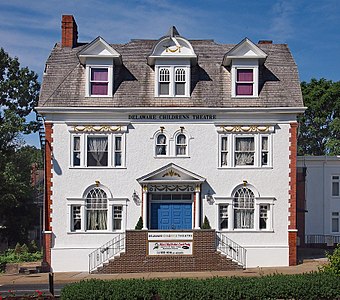Minerva Parker Nichols


Minerva Parker Nichols (May 14, 1863 – 1949) was an architect from the United States.
Early years and education[]
Minerva Parker was born May 14, 1863, in Chicago, Illinois. She was a descendant of John Doane who landed in Plymouth, in 1630, and took an active part in the government of the colony. Seth A. Doane, the grandfather of Nichols was an architect and went to Chicago when it was an outpost and trading settlement among the Native Americans. Her father, John W. Doane, died in Murfreesborough, Tennessee, during the Civil War, being a member of an Illinois Volunteer Regiment.[1]
She studied at the Philadelphia Normal Art School, and studied modeling under John Boyle.[1]
Career[]
Nichols entered an architect's office as draftsman.[1] She joined the architectural firm of Frederick G. Thorn in Philadelphia. She took control of the firm after Thorn's death in 1888 and held the position for seven years. In 1896, she and her husband left the Philadelphia area and she began a private practice mostly for friends and relatives.[2]
Nichols was the second (after Louise Blanchard Bethune) American female architect who established a very successful, although brief, business and recognition, and the first one who did so without partnership or assistance of a man.[3][4][5]
Later, she built the Woman's New Century Club, in Philadelphia. Besides her practical work in designing houses, she delivered in the School of Design, in Philadelphia, a course of lectures on Historic Ornament and Classic Architecture. Among some of her important commissions was one for the designing of the International Club House, known as the Queen Isabella Pavilion, at the World's Columbian Exposition, Chicago, in 1893. She was among the first women to enter the field of architecture and some of the homes in the suburbs of Philadelphia attest to her ability and talent in this line. In December, 1899, she married Rev. William J. Nichols, a Unitarian clergyman. [1]
Notable buildings[]
- New Century Club (Philadelphia)
- New Century Club (Wilmington, Delaware)
- Buckingham Browne & Nichols school, Cambridge, Massachusetts (1894)[4]

New Century Club, Wilmington

New Century Club, Philadelphia

, Philadelphia
References[]
- ^ Jump up to: a b c d Logan 1912, p. 786.
- ^ Zaitzevsky, Cynthia. Long Island Landscapes and the Women who Designed Them. New York: W. W. Norton and Co., 2009: 257. ISBN 978-0-393-73124-8
- ^ Margaret Lester, Specialization and Significance: An Assessment of the Career and Works of Minerva Parker Nichols
- ^ Jump up to: a b editor, Edward T. James, editor; Janet Wilson James, associate editor; Paul S. Boyer, assistant (1974). Notable American Women, 1607–1950: A Biographical Dictionary (3. print. ed.). Cambridge, Mass.: Belknap Press of Harvard University Press. p. 630. ISBN 0-674-62734-2.CS1 maint: extra text: authors list (link)
- ^ Prather-Moses, Alice Irma (1981). "Nichols, Minerva Parker". The International Dictionary of Women Workers in the Decorative Arts. The Scarecrow Press. p. 122. ISBN 0-8108-1450-1.
Bibliography[]
 This article incorporates text from a publication now in the public domain: Logan, Mrs. John A. (1912). The Part Taken by Women in American History (Public domain ed.). Perry-Nalle publishing Company. p. 786.
This article incorporates text from a publication now in the public domain: Logan, Mrs. John A. (1912). The Part Taken by Women in American History (Public domain ed.). Perry-Nalle publishing Company. p. 786.
External links[]
- "Minerva Parker Nichols: A First American Woman Architect, 1860-1943"
- Minerva Parker Nichols at Philadelphia Architects and Buildings
- Preserving Minerva, website by architectural historian Molly Lester
- 1863 births
- 1949 deaths
- American architects
- American women in business


